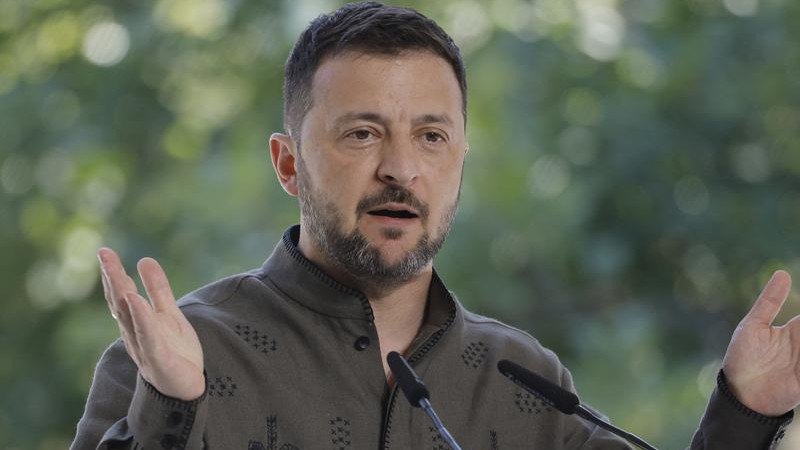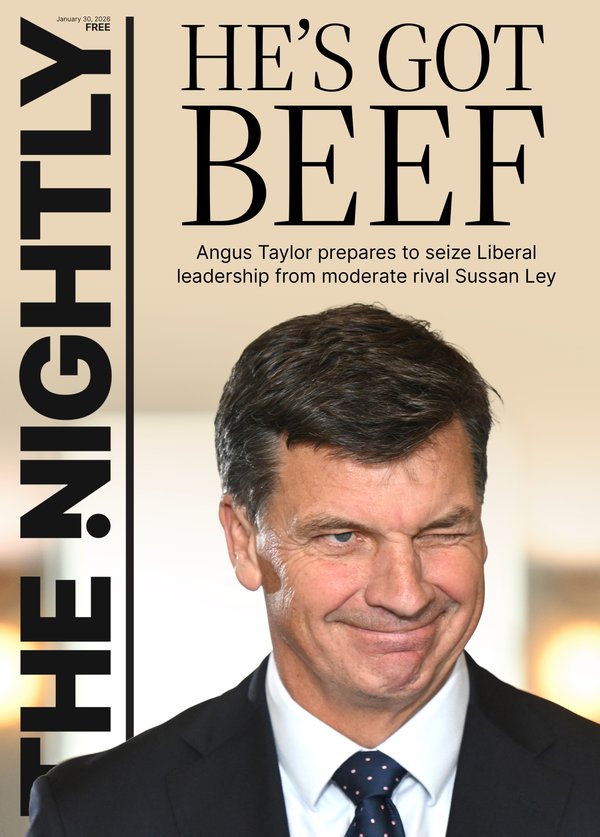Volodymyr Zelenskiy calls Vladimir Putin ‘sick old man’ after Ukraine ‘drone missile’ attacks
Volodymyr Zelenskiy says a ‘drone missile’ called Palianytsia has been used against Russian forces.

President Volodymyr Zelenskiy has touted a newly developed Ukrainian “drone missile” that he says will take the war back to Russia and scornfully derided Russia’s Vladimir Putin as a “sick old man from Red Square”.
As Ukraine marked 33 years of post-Soviet independence, Zelenskiy said the new weapon, Palianytsia, was faster and more powerful than the domestically made drones that Ukraine has so far used to fight back against Russia, striking its oil refineries and military airfields.
“Our enemy will ... know what the Ukrainian way for retaliation is. Worthy, symmetrical, long-ranged,” he said.
Sign up to The Nightly's newsletters.
Get the first look at the digital newspaper, curated daily stories and breaking headlines delivered to your inbox.
By continuing you agree to our Terms and Privacy Policy.Zelenskiy said the new class of Ukrainian weapon had been used for a successful strike on a target in Russia, but did not say where.
He used derisive language to describe Russia’s 71-year-old president.
“A sick old man from Red Square who constantly threatens everyone with the red button will not dictate any of his red lines to us,” he said in a video on the Telegram messaging app.
Russia, which has attacked Ukraine with many thousands of missiles and drones since it invaded in February 2022, has decried Ukraine’s drone attacks as terrorism.
Russian troops are advancing in Ukraine’s east and occupy 18 per cent of the country.
Zelenskiy has been pressing Ukraine’s allies to allow him to use foreign weapons deeper in Russian territory such as to strike air bases used by Russian warplanes that pound Ukraine with missiles and glide bombs.
“I want to stress once more that our new weapon decisions, including Palianytsia, is our realistic way to act while some of our partners are unfortunately delaying decisions,” Zelenskiy told a news conference.
Ukrainians say the word “Palianytsia,” a type of Ukrainian bread, is too difficult to pronounce for Russians and it has been used - sometimes humorously - during the war as a way to tell Ukrainians and Russians apart.
“It will be very difficult for Russia, difficult to even pronounce what exactly has hit it,” Zelenskiy said of the drone missile.
In a decree, Zelenskiy promoted his top commander, Colonel General Oleksandr Syrskyi, to the rank of general, a tacit gesture of praise after Ukraine’s lightning cross-border incursion into Russia’s Kursk region launched on August 6.
Cast by Russia as an escalation and major provocation, Ukraine’s incursion has captured more than 90 settlements in the Kursk region according to Ukrainian officials, the biggest invasion of Russia since World War II.
Speaking at a joint news conference with the leaders of Poland and Lithuania, Zelenskiy told reporters the operation had in part been a preventive move to stop Russian plans to capture the northern city of Sumy.
Apart from capturing prisoners of war and creating a “buffer zone,” Zelenskiy said the operation had other objectives that he could not disclose publicly.
Independence Day has surged in importance for Ukrainians during the invasion, which has spurred widespread patriotic sentiment.
To mark the date, Zelenskiy ratified the Rome Statute, paving the way for Ukraine to join the International Criminal Court, one of many steps needed to join the European Union, accession to which Ukraine sees as a priority.
He also signed legislation banning the activities of religious groups linked to Russia, creating a legal instrument for the government to ban a branch of the Orthodox Church it accuses of being aligned with Russia.
Ukraine and Russia also said they had each secured the release of 115 prisoners of war after the United Arab Emirates acted as an intermediary.
It is the first such exchange since Ukraine launched a surprise attack on Russia’s Kursk region.
According to the Russian defence ministry, the Russian servicemen swapped on Saturday were captured in the Kursk region.
All released Russian soldiers are now in Belarus and will receive medical treatment and rehabilitation upon their return to Russia.
The ministry expressed gratitude for the UAE’s role in facilitating the prisoner swap.
Zelenskiy posted a picture with Ukrainian PoWs wrapped in the country’s blue and yellow flags and hugging each other.
He said that the returned were servicemen from the border guards, the national guard, the navy and the armed forces.
Zelenskiy expressed gratitude to the Ukrainian troops who helped replenish the pool of prisoners for exchange.
